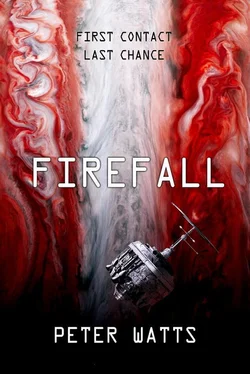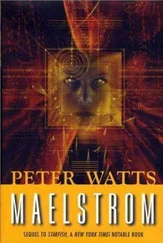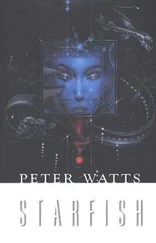So. The laws of physics were the OS of some inconceivable supercomputer called reality . At least that explained why reality had a resolution limit; Planck length and Planck time had always looked a bit too much like pixel dimensions for comfort. Past that, though, it had always seemed like angels dancing on the head of a pin. None of it changed anything way up here where life happened, and besides, positing universe as program didn’t seem to answer the Big Questions so much as kick them down the road another order of magnitude. Might as well just say that God did it after all, head off the infinite regress before it drove you crazy.
Still…
“A process,” Brüks mused. That sounded more—modest, at least. He wondered why Lianna had never spelled it out during their debates.
Sengupta’s head bobbed. “What kind of process though that’s the question. Master algorithm defining the laws of physics or some daemon reaching up to break ’em?” Her eyes flickered briefly toward his, flickered away at the last instant. “That’s how we know it exists in the first place. Miracles.”
“Miracles.”
“Impossible events. Physics violations.”
“Such as?”
“Star formation way below the z-limit. Photons doing things they’re not supposed to the metarules changing over by the Cloverleaf Nebula. They vindicated the Smolin model or something I dunno it’s beyond me so you’d never get it in a million years. But they found something impossible. Way down deep.”
“A miracle.”
“I think more than one but that’s what I said.”
“Wait a second.” Brüks frowned. “If the laws of physics are part of some universal operating system and God, by definition, breaks them…you’re basically saying…”
“Don’t stop now roach you’re almost there.”
“You’re basically saying God’s a virus .”
“Well that’s the question isn’t it?”
Portia iterated before them.
What was it Lianna had said? We’ve always thought c and friends ruled supreme, out to the quasars and beyond. What if they’re just some kind of local ordinance?
“What if they’re a bug ?” he murmured.
Sengupta grinned and stared at his wrist. “Change the whole mission wouldn’t it?”
“This mission?”
“ Bicameral mission the mission of the whole Order. Reality’s iterating everywhere but there’re these inconsistencies. Maybe not the right reality, mmm? Change alpha a just bit and the universe stops supporting life. Maybe alpha’s wrong . Maybe life’s just a parasitic offshoot of a corrupted OS.”
Somewhere in Brüks’s head, a penny dropped.
For fifteen billion years, the universe had been shooting for maximum entropy. Life didn’t throw entropy into reverse—nothing did—but it put on the brakes, even as it spewed chaos out the other end. The gradient of Life was the first scale any aspiring biologist learned to sing: the further you kept yourself from thermodynamic equilibrium, the more alive you were.
It’s the anthropic principle’s evil twin, he thought.
“What—what is this mission, exactly?” Brüks asked softly.
“Mmmm.” Sengupta rocked gently back and forth. “They know God exists already that’s old. I think now they’re trying to figure what to do with It.”
“What to do with God.”
“Maybe worship. Maybe disinfect.”
The word hung there, reeking of blasphemy.
“How do you disinfect God?” Brüks said after a very long time.
“Don’t ask me I just fly the ship.” Her gaze slid back to the bulkhead, to the church of AUX/RECOMP and the alien emissary there.
“I think that puppy’s giving them some ideas though,” she said.
Lianna Lutterodt was lost in inner space when he sailed through the Commons ceiling. She blinked as he bounced off the deck, shook her head: her eyes came back to the here and now as a courtesy window opened on the bulkhead. A flatscreen concession to the neurologically disabled.
Icarus. The confessional. A rosette of spacesuited monks, outward facing, visors raised to bare their souls before the Face of God.
“Hi,” Brüks said carefully.
She nodded around a mouthful of couscous. “Rakshi says you made some serious headway. Even gave it name.”
He nodded. “ Portia . It’s pretty amazing, it…”
Her gaze drifted back to the window. She can’t take her eyes off them, he thought, just as she did and caught him looking: “What?”
“It’s not just amazing,” he told her. “It’s actually kind of scary.” He dipped his chin at the feed. “And they cut pieces out of it.”
“They take samples, ” Lianna said. “Almost like real scientists.”
“Something that reaches down across half a light-year and makes our own machines do backflips around the laws of physics.”
“Not like they can get all the answers by just staring at it all day.”
“I thought that was exactly how they got their answers.”
“They know what they’re doing, Dan.”
“That’s one hypothesis. Want to hear another?”
“I’m not sure.”
“Ever hear of induced thanoparorasis?” he asked.
“Uh-huh.” Lianna shrugged. “Common procedure among the augmented. Keeps ’em from collapsing into existential angst.”
“It’s a bit more fundamental than that,” Brüks said. “Have you got it?”
“Thanoparorasis? ’Course not.”
“Are you going to die?”
“Eventually. Hopefully not for a while.”
“Good to know,” Brüks told her. “Because if you were a victim of ITP, you wouldn’t be able to answer that question. You might not even have heard it.”
“Dan, I don’t—”
“You and I”—raising his voice over hers—“we’re blessed with a certain amount of denial. You admit you’re going to die, you even know it intellectually on some level, but you don’t really believe it. You can’t. The thought of dying is just too damn scary. So we invent some Fairyland Heaven to take us in after we pass on, or we look to your friends and their friends to give us immortality on a chip or—if we’re hard-core realists—we just pay lip service to death and decay and keep right on feeling immortal anyway.
“But some folks”—he nodded at the feed—“just get too damn smart. They put their heads together and develop insights way too deep to paper over with a few million years’ worth of whistling past the graveyard. People like that would know they were going to die, they’d feel it in the gut. They’d know what death means in a way you or I never could. And the only way they can keep from collapsing into whimpering puddles is to give denial a hand, cut a cognitive hole into the middle of their heads. We may live in denial most of the time but those people—they didn’t even show a fright response when it looked like their whole damn hive was an hour from the morgue. Like those agnosiacs who’d die of thirst in their own homes after some tumor’s destroyed their ability to recognize water.”
“I don’t think they’re like that,” Lianna said softly.
“Sure you do. You told me as much, remember? Reset the sensory biases, randomize the errors.”
They watched in silence as the hive poked a stick at something dangerous.
“A lot of them died, not so long ago,” Brüks said after a while.
“I remember.”
“Me, too. And you know what I remember the most, you know what I can’t forget? Luckett rolling around in his own shit while his spinal cord shorted out, smiling and insisting that everything was going according to plan.”
Читать дальше








